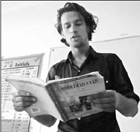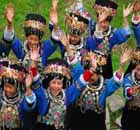Profiles
China's whistleblower doctor, Gui Xi'en
(Xinhua)
Updated: 2009-11-30 15:17
Chinese media called Gui a medical hero, who has helped improve the country's public health policy and benefit hundreds of thousands of people. But, Gui is far more comfortable talking about the villagers than discussing his role in revealing the epidemic. "I just did what a doctor should do," he says.
Reaching Out
On this Saturday morning, when Gui arrived at a bus stop outside Houyang village, Zhao Qiang (not his real name), a villager with HIV, is already there waiting for him.
After picking him up, Zhao takes Gui by his motor-pedicab directly to his home, where HIV carriers and AIDS patients are waiting.
"I cannot take him to the village clinic. There would be too many people coming to see him. He might not be able to leave today."
As Gui sees his patients at Zhao's dilapidated house, Cheng Dong (not his real name) waits anxiously at the Shangcai County Hospital. Cheng's cousin with AIDS is in hospital. Cheng calls Gui and asks him to come. He also wants Gui's help in getting his daughter enrolled in a good local high school.
Cheng sees nothing inappropriate in his requests. He is sure Gui will help. Cheng was among the first 10 HIV-positive villagers Gui diagnosed 10 yeas ago, and Gui has continued to give him medical and financial help since.
"He is a marvelous man," Cheng says. "He was unpopular here in the past. Since Premier Wen visited him, everything has changed. But he does not change. He is still the Dr. Gui I know."
Despite his age, Gui still works full time and spends most weekends and holidays visiting poor peasants, a routine he formed almost 50 years ago.
In 1960, Gui, a medical school graduate aged 23, volunteered to work in the remote hinterlands of Qinghai Province on the Qinghai-Tibet Plateau, answering the government's call for young intellectuals to work and settle in frontiers.
During his 16 years in Qinghai, he focused on curbing infectious diseases and endemics, like measles, typhoid and plague. But as medical staff were scarce, he was also surgeon, laboratory analyst, anesthetist and pharmacist.
He once amputated the seriously injured arm of a herdsman. "The man said I saved his life and was grateful to me. But I felt sorry for him, because a proficient surgeon with good facilities might have been able to save his arm."
Gui recalls visiting and treating the herders' families. "I didn't need Tibetan translators at that time because I spent so much time with them that I could speak Tibetan fairly well."
The bleak and wild plateau also served as a refuge that kept Gui from the turbulence of the Cultural Revolution (1966-76).












